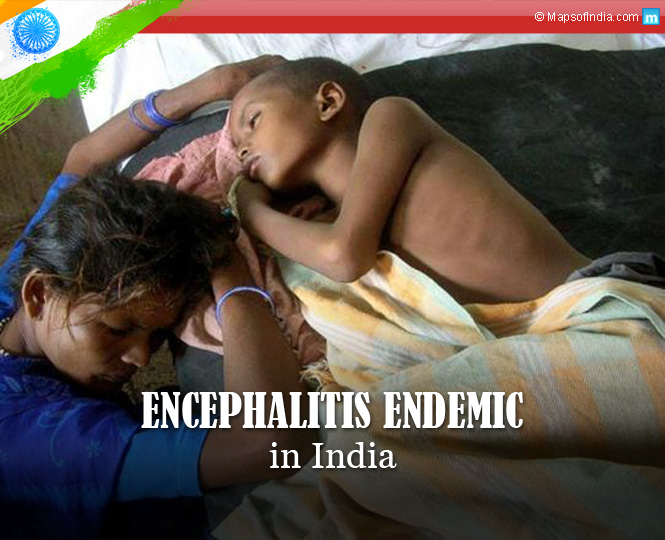As per government statistics, 1,273 people died of encephalitis in 2013. The number of deaths by encephalitis were more than deaths from malaria (440) and deaths from dengue (193). This year’s condition is no different from the previous one – encephalitis has engulfed near about 570 people so far and there seems no stoppage to this, as health ministry is suspecting more deaths from encephalitis. Out of total 111 died in West Bengal and 165 in Assam.
Outbreak of encephalitis which is commonly known as “brain fever” occurs particularly during monsoon season. The most common strains are Acute Encephalitis Syndrome and Japanese Encephalitis (JE) which hit India every year and cause hundreds of deaths. Usually, encephalitis is the most widespread in Uttar Pradesh and Bihar but it also affects West Bengal and Assam. Though we have all the figures, our specialists know the preventive and control measures yet the encephalitis outbreak kills hundreds of people especially children each year in India.
The first detection of JE was done in 1955 in Tamil Nadu. During the period between 1955 and 1966, near about 65 cases of encephalitis were detected in Southern India. Since 1955 there have been many major outbreaks of this epidemic across the nation. One of the worst was in the Bankura District of West Bengal in 1973. It had fatality rate of 42.6%. In 1978, cases of encephalitis were reported from 21 states and union territories of India. JE claimed 297 lives in Gorakhpur, UP in 1978 when 1,002 cases were reported. Between 1978 and 2005 encephalitis claimed 10,000 lives in the state. As per estimates, 597,542,000 people lives in encephalitis prone regions of India.
The most vulnerable season
Monsoon is the most susceptible season as it provides enough water to mosquitoes to breed. The disease is also prevalent in flood hit areas and areas where there is lots of stagnant water. Floods contaminate ground water which is one of cause of encephalitis.
What causes Encephalitis?
Mosquito or insect bites, contaminated food and water and breathing in the respiratory droplets of infected person can cause Encephalitis.
Symptoms of Encephalitis
Encephalitis is an acute inflammation of the brain caused by viruses. Its symptoms include fever, headache, drowsiness, confusion and fatigue. Advance level symptoms may include convulsions or seizures, tremors, memory problems and hallucinations. Young children and infants will show symptoms like high fever, poor appetite and irritability.
Health department has sounded red alerts and set up clinics across the affected areas of West Bengal. They are also keeping a vigil on the mosquito breeding particularly around pig farms as it is the high risk zone. Though encephalitis can affect anyone but elders and infants are more vulnerable.
What should be done?
Government must take preventive as well as control measures to nip evil in the bud. First of all, identify the encephalitis endemic regions. Mosquito control and an organized immunization system are the two important factors to be considered while taking preventive measures. Use of insecticide, bed nets, fogging with very low-volume insecticides should be recommended.
Government must take steps to implement large-scale immunization schedule to the susceptible human population. Government has taken few steps in this regard and launched the JE vaccination campaign during 2006. In this campaign 11 out of the most sensitive districts in Assam, Karnataka and Uttar Pradesh were covered. In total 86 JE endemic districts across India were covered.
Government must make laboratory testing kits available in prone areas for easy and quick diagnosis of the disease.
Fogging must be carried out in prone as well as nearby areas.
Hospitals must have adequate medicines in advance for speedy treatment.
Government must ensure to provide clean and safe drinking water across the year.
Government must take measures to improve sanitation and water quality.
Encephalitis spreads largely because of environmental and ecological factors. It can be controlled by taking preventive measures including a well-developed surveillance system and immunization programme.





